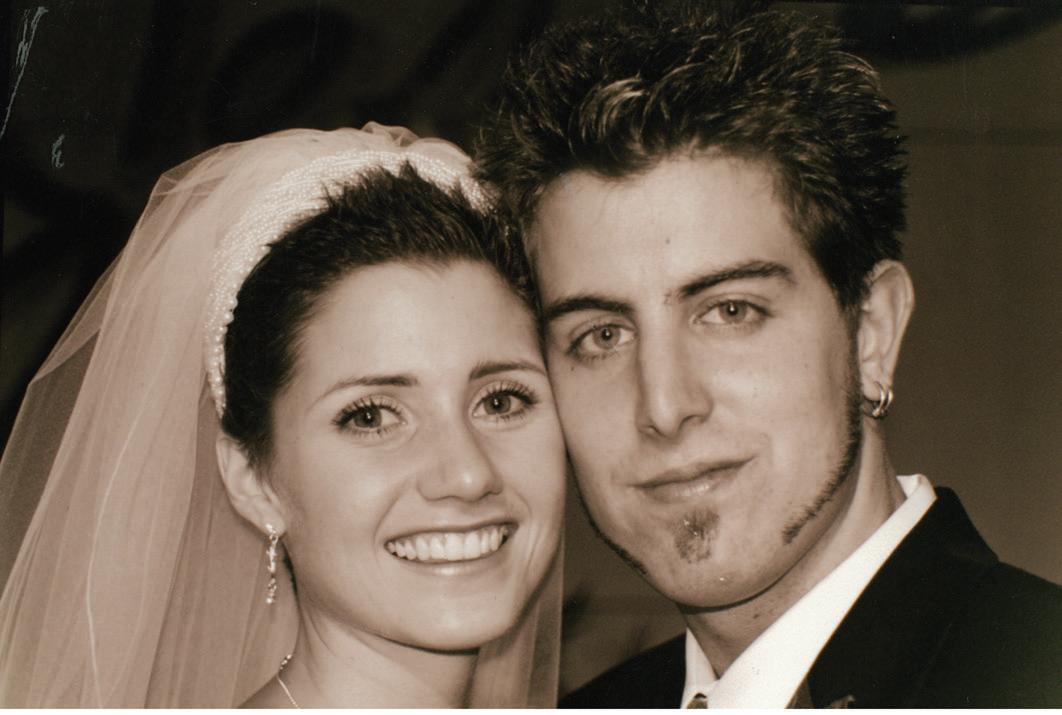
21 minute read
DON’T GROW WEARY DOING GOOD
Don’t Grow Weary Doing Good By: David Mathis
Those who genuinely “do good” will be tempted soon enough to grow weary. Give yourself to doing good for others—on God’s terms, to fulfill his calling—and it’s just a matter of time before you will be tempted to tire.
Advertisement
Even the apostle Paul, with the utter clarity of his calling, testified to “fighting without and fear within” (2 Corinthians 7:5). And becoming spiritually and emotionally drained was enough of a temptation in his day that he wrote twice in his letters, “Do not grow weary in doing good” (Galatians 6:9; 2 Thessalonians 3:13).
Weariness can be contagious (Deuteronomy 20:8). But when we fight back, it also can work the other way: to help others persevere. God means for us not only to endure in “doing good” ourselves but to help others “not grow weary” (1 Thessalonians 5:14).
When doing good gets tough—and it will—Paul does not simply say, “Don’t quit.” He says, “Do not grow weary.” How Not to Grow Weary
God does not rescue us from sin and death to then do nothing. He means for his people to give our lives, what precious little time we have, to “doing good.” “As we have opportunity, let us do good to everyone, and especially to those who are of the household of faith” (Galatians 6:10). That kind of doing doesn’t simply “overflow” or happen effortlessly. It takes intentionality and practice and planning. “Let our people learn to devote themselves to good works, so as to help cases of urgent need, and not be unfruitful” (Titus 3:14).
“Doing good” is not just for peaceful, convenient times in our lives but just as much for seasons of suffering and conflict. “Let those who suffer according to God’s will entrust their souls to a faithful Creator while doing good” (1 Peter 4:19; see also 1 Peter 2:15). Are we excused from “doing good” when wronged? “See that no one repays anyone evil for evil, but always seek to do good to one another and to everyone” (1 Thessalonians 5:15). How do we fight back against the darkness? “Do not be overcome by evil, but overcome evil with good” (Romans 12:21). Jesus himself champions, “I say to you who hear, Love your enemies, do good to those who hate you” (Luke 6:27).
First, when tempted to grow weary, ask with open hands, Am I “doing good” on God’s terms for others’ good and not just my own? Am I serving others, or self, with my sense of calling? When resistance comes, internally or externally, we do well to ask about the nature of the opposition:
• Is this resistance a gift from God?
• Are people who manifestly love me trying to helpfully redirect me?
• Am I being opposed by those who aren’t defining “good” on God’s terms?
• In my “doing good,” am I seeking my own glory instead of God’s (John 7:18)?
Opposition presents us with the opportunity to humble ourselves and test our labors. The temptation to weariness begins as a chance to check our own hearts. As we release our grip on what we’re doing, we can test to what degree it is “good,” and whether it might be better. Are we truly serving the needs of others, or just actualizing our own selfish desires? 2. Expectantly turn to God.
Peeling the onion of our own hearts will only get us so far. We need solid footing outside ourselves to persevere. When we feel the temptation to weariness, we have somewhere to turn— someone to turn to—for clarity and direction and strength. We are not left to drum it up from within. We know the one who does not faint or grow weary.
Have you not known? Have you not heard? The Lord is the everlasting God, the Creator of the ends of the earth. He does not faint or grow weary; his understanding is unsearchable. (Isaiah 40:28)
And not only do we have our divine, heavenly Father but also his fully human, flesh-and-blood Son who himself “went about doing good” (Acts 10:38). Jesus faced relentless resistance. He knew weariness (John 4:6). He felt opposition—from within in Gethsemane and from without at Golgotha. We look to him “who endured from sinners such hostility against himself, so that you may not grow weary or fainthearted” (Hebrews 12:3)— not just “not quit” but “not grow weary.”
After humbly testing ourselves, one concrete, powerful avenue we have for not growing weary is to turn our attention to Christ. But how, specifically? When faced with weariness in our good works, how do we “consider Jesus” (Hebrews 3:1; 12:2) and draw strength from our God who “does not faint or grow weary” (Isaiah 40:28)?
3. Confidently lean on his promises.

God has given us his word that we might learn to lean on God himself—not just generally on true ideas, concepts, and Christian slogans but specifically on the actual words of God for us, letting all the ways God speaks to us brace us for doing good.
Hear the risen Christ say to you through his appointed spokesman, “My beloved brothers, be steadfast, immovable, always abounding in the work of the Lord, knowing that in the Lord your labor is not in vain” (1 Corinthians 15:58). Or rehearse the very words of Jesus in this parable:
Th e kingdom of God is as if a man should scatter seed on the ground. He sleeps and rises night and day, and the seed sprouts and grows; he knows not how. Th e earth produces by itself, fi rst the blade, then the ear, then the full grain in the ear. But when the grain is ripe, at once he puts in the sickle, because the harvest has come (Mark 4:26–29).
We humble ourselves, turn to God, open his Word, and trust what he says—not what we see. We seek to readjust our hearts to his truth, not allowing the world’s appearances to steer us. We aim to lean not on our own understanding, whether self-justifying or self-doubting, but on his specifi c words and promises to us in the Book.
4. Patiently trust his timing.
Walking by faith in God’s promises is no magic spell to force his hand. Trusting his words doesn’t bend his arm to conform to our timing. Rather, it readies us to adjust our sense of timing to his. Th at is the great ground on which Paul gives his charge in Galatians 6:9: “Let us not grow weary of doing good, for in due season we will reap, if we do not give up.”
How oft en does our weariness stem from our own sense of “due season” instead of God’s?
God has impeccable timing. His promise to exalt us, if we humble ourselves under his mighty hand, comes with one of the most important phrases in the New Testament: “at the proper time” (1 Peter 5:6). If you are genuinely “doing good” on God’s terms— serving others, not self—and you are discouraged by the result or the opposition, take this promise to heart: you will reap in due season. God will exalt you at the proper time. Keep sowing faithfully. God sees. He knows. In Christ, your labor will not be in vain.
Where Doing Good Happens
Both prominent charges to “not grow weary doing good” (Galatians 6:9; 2 Th essalonians 3:13) are humble and out-of-the-spotlight contexts. Th e vast majority of “doing good” happens not in the limelight to be celebrated by thousands but in the private, unobserved place where God’s kingdom goes forward and eventually turns the world upside down. Doing good is not like the fl ash and sizzle of fi reworks but the slow, organic growth of crops. Not through remotes and apps that let us feel a sense of control but through planting and watering and waiting that forces us to trust in God.
When Christ gives us a particular calling to fulfi ll, he emphatically does not promise that it will come easy. In fact, it is oft en precisely the opposite. Diffi cult obstacles emerge to confi rm the genuineness of our calling. Th e breakthrough will come not in retreat but in enduring under trial with faith in God’s promises. We may even swell in hope as obstacles increase, anticipating that the breakthrough we need may be near at hand.

David Mathis (@davidcmathis) is executive editor for desiringGod.org and pastor at Cities Church in Minneapolis/ St. Paul. He is a husband, father of four, and author of Habits of Grace: Enjoying Jesus through the Spiritual Disciplines.
Identity Crisis: AVERTED 3 Critical Things Every Middle Schooler Needs to Navigate Identity By: Kate Hartley Photos: David Cannon



hen asked to name a time in our lives that we would least like to revisit, many of us would resoundingly answer: “Middle school!” Th ose years of braces and breakouts leave their mark on us all. So, take the normal awkwardness of adolescence and add in smart phones, social media, and cyberbullying, and you quickly see why today’s youth emotionally struggle more than any previous generation. In October, the Center for Disease Control released sobering statistics: the suicide rate among teens has increased by 56% in the last two decades, since 2000. 1 So, as a parent today, how can you help your child navigate the churning waters of middle school? “Th e answer is in Proverbs 4:23, which says to guard your heart because everything you do fl ows from it,” says Craig Konchak, a licensed professional counselor and the Middle School principal at North Cobb Christian School (NCCS) in Kennesaw. “We can’t compete with social media. We can’t erase peer pressure. Th e best thing we can teach our kids is how to guard their hearts.” How do you do this, exactly? Here, Konchak shares the unique approach they use to “guard the hearts” of adolescents at North Cobb Christian School. As parents, we can all take a page from this wise approach. Uncover Unique Genius. W


“Middle School is a journey towards identity. First, ground a child’s identity in Christ, conveying that there is a Creator of the universe who loves you,” shares Konchak. “Once they know Whose they are, they can discover who they are.” At NCCS, students explore their God-given identities by participating in the school’s innovative Pathways Program. Th rough refl ections and self-evaluations, students discover their spiritual gift s, aptitudes, budding purpose, and more. Th eir fi ndings are compiled into portfolios: a portrait of who God has uniquely created them to be. NCCS students are also encouraged to get involved in an athletic or artistic pursuit. “NCCS off ers everything from mountain biking to musicals, plus middle schoolers participate in clubs every Friday like drone-fl ying, craft ing, and outdoor adventures,” Konchak explains. “When adolescents know where they shine, they’re more likely to remain fi rmly planted in who they are, regardless of social pressures.”
Give Them A Guide. As middle schoolers move from concrete to abstract thinking, they benefi t from mentors to help process life. “Middle school is a time of peaks and valleys. Th ey need someone who has gone through it to say, ‘Keep climbing; the next mountaintop is just ahead,’” affi rms Konchak, who notes that godly teachers make the best mentors. “Our alumni always attest to the lasting impact of our teachers, who become like family. We call their impact the ‘hidden curriculum.’” Students in 5th through 12th grade at NCCS bond with teachers (and each other) during Advisory Groups—teacher-led small groups of same-gender students that meet regularly to process life. NCCS also off ers the Timothy Peer Mentorship Program, connecting older and younger students in a “big brother / big sister” format. Broaden Perspectives. And, fi nally, Konchak says that adolescents need experiences in “real time”—off devices—to ensure an accurate worldview. “We start every year by taking all of our 5th through 12th grade students on retreats,” shares Konchak. “Th ey unplug, bond, and have a blast.” NCCS students also go on Spring Term, an annual week of missions and cultural trips. Middle school trips include Savannah and Washington, D.C., while high school students have global options from Haiti to Hawaii. “Th rough these adventures— many of which focus on serving others—identity is shaped,” says Konchak. “Th ey’re learning: this is who God created me to be, and this is my purpose in this wide and wild world.”
To meet NCCS’s education experts, set up a personalized tour of the school any time by calling 770-975-0252 or emailing admissions@ncchristian.org. | North Cobb Christian School |Preschool K3 - 12th Grade Fully Accredited | Award-Winning Arts, Athletics, & Academics | 4500 Eagle Drive, Kennesaw, GA 30101 | ncchristian.org | 770-975-0252
JEREMY Camp

By: Maggie Boggs
I Still Believe: Jeremy Camp on Loss, Love, and Loyalty to God
When Jeremy Camp was sixteen, he didn’t plan to play music for a living. He had no idea that he would become a national sensation in the Christian music industry. He didn’t expect to receive a Grammy nomination, or sing forty #1 radio hits, or inspire a movie based on his life. Nor did he know that tragic loss and restoring love would mark his story. Like most of us, Camp had no way of anticipating the triumphs and trials of the future—triumphs and trials that, by the grace of God, often remain hidden to our eyes until they happen. When Camp was sixteen, he packed his bags and set off for youth camp. He had just written a song called “Set Me Free.” As a young teenager, Camp had been struggling with worldly temptations, but he was eager to make a change. He sensed that the path he had been traversing was dangerous, and he wanted to turn around. “The song was literally a cry of my heart saying, ‘You gotta set me free from sin. Help me, Lord,’” recounts Camp. “God just spoke to my heart and said, ‘I want to use you, Jeremy, but you’re on the edge of a cliff about ready to jump off. You need to run as far away as possible.’ It was kind of like this almost sobering moment—like, ‘You’re living in sin, but you’re about ready to dive into a darker part of it.’” Camp remembers this turning point in his faith journey not as a condemnation but a rescue. When explaining how the Lord convicted him at youth camp that year, Camp clarifies that “it was out of love,” a description of God’s discipline not unlike the image presented in Hebrews 12 of a loving father correcting his son. And in response, Camp felt an awakened love for his Heavenly Father that prompted him into submission: “I said, ‘God, whatever you want
me to do, I’ll do. I’ll serve you with all my heart.’” Camp would hold on to his openhearted willingness to do God’s will through his calling to be a musician, through the devastating loss of his first wife, and through his involvement with the production of I Still Believe, the just-released movie based on his memoir of the same name. “It was in Bible college when I really felt God saying, ‘I want you to play music,’” Camp shares, adding, “It was interesting. I wasn’t like, ‘I want to do this. That’s all I want to do.’ It was more, ‘God, whatever You want me to do, I’m willing.’ And He started opening doors for me and…bringing the right people alongside me to mentor me and encourage me. And it came to the point where I just said, ‘Okay, obviously this is of You because I’m walking through doors that You’re opening, not me forcing it and kicking it down.’” And it was after Bible college that God opened up yet another door for him. Camp met his first wife, Melissa, at a church group in San Diego where he was leading worship. Fans familiar with the story know that, after dating and quickly falling for Melissa, Camp learned she had cancer. Though he knew the cancer could mean the end of her life, they were married on October 21 of 2000. On February 5 of the following year, just four and a half months later, Melissa passed away. Despite living against a backdrop of sorrow and grief after Melissa went to be with the Lord, Camp decided to remain faithful to God’s calling for his life. The first song he wrote after her death was “I Still Believe,” a song saturated with the defining resilience of Camp’s story. For those who aren’t familiar with the song’s affecting lyrics, the chorus of “I Still Believe” is a powerful proclamation of faith in the unseen:
I still believe in Your faithfulness I still believe in Your truth I still believe in Your holy Word Even when I don’t see, I still believe. And today, when asked what he would like to say to encourage other Jesus


followers, Camp again highlights this sort of faith-in-the-unseen trust. With striking vulnerability and humility, he explains that trusting God is still hard: “Because of what happened to my wife, the enemy tries to attack me.” Specifically speaking, he sometimes fears more heartbreak and pain, or wonders whether God really inhabits the minor details of our days. Yet Camp speaks of how, in those moments full of doubt, God is full of tender faithfulness. “One thing that God constantly shows me and encourages me with is the saying, ‘Jeremy, perfect love casts out fear—like if you understood how deeply I love you, how much I love you.’” Camp cites Romans 8:39 to make his point: Nothing can separate us from the love of Christ. “That’s when you really go to the depth of going, ‘Oh, my word. Okay, God, You do love me.’ And I think we have to understand that God’s not out to get us, that He loves us and that He has good plans for us,” says Camp, who has been blessed with his current wife, Adrienne, and their three children. He adds, “Now, it doesn’t take us away from going through trials and tribulations. We’re going to go through those…He’s trustworthy, and it doesn’t mean it’s not gonna always be hard or difficult, but He is good, and He loves you.” Camp maintains that God’s grace is sufficient, even when we walk through difficulties. When Camp goes through tough times, he takes care to look backwards with intentionality. He explains that, by remembering how God’s grace and peace were sufficient in the past, we can move forward with confidence that His grace and peace remain sufficient for the present. “I always encourage people—it’s like, if you never trust again, then you’ll never walk again, you’ll never move on again. And I think you have to move on, and you have to know that you may stumble again. You may have a hard time again, but His grace is sufficient for thee.” “One thing that God constantly shows me and encourages me with is the saying, ‘Jeremy, perfect love casts out fear...’”

But what about those trials that are so heavy, so cumbersome, so painful? Camp’s been there. He admits that he doesn’t have all the answers, that all he can say to people is to go to God. But in the middle of pain, sometimes people just don’t want to hear it. Nonetheless, Camp insists that trusting God to carry us through hardship is worthwhile. Two years ago, he experienced a downward spiral that kept him bed-ridden for a week. “I don’t have the formula of how to get through things,” he confesses. “I can tell you that I decided to trust the Lord again, and He has been there for me when things have gotten tough again.” Camp talks about how he prayed, worshipped, and sought God through that low week, and God faithfully hoisted him “out of that pit.” Even with a star-studded Lionsgate fi lm hitting theaters this month, Camp’s desire for I Still Believe is that Christ would be glorifi ed, not himself. “I don’t need another notch in my belt,” Camp says. “If this doesn’t really impact the kingdom, then there really is no point.” When asked what he would like to share about I Still Believe, he zeroes in on the fi lm’s domestic and international reach and its potential to spread hope to those viewers. In Camp’s eyes, the movie extols Christ and celebrates the hope that only He can bring. He goes on to admit that having his life’s story on display for millions of people is “not easy.” Th at’s because, of course, I Still Believe centers around his relationship with Melissa and how God brought him through the death of his spouse. Camp refers to Melissa’s passing as “the darkest part of my life.” He realizes that he will “get questions from people and, you know, story aft er story from people,” but he’s willing to carry the “responsibility and weight of that.” Camp knows “it’s for ministry and for the kingdom.” Th is kingdom mindset serves him well in other areas of his life too. In his walk with the Lord right now, God is teaching him to steward relationships with the people in his life from a place of humility and grace, Camp explains. “I’ve had a lot of diff erent things come up through confl ict,” he says. “People say things that aren’t true and you’re just…hurt. And the natural reaction is, of course, to be off ended or to be like, you know, ‘You don’t know what you’re talking about,’ or, ‘How could you do that?’” In those situations, he has to take a step back and realize that God wants to refi ne him through the hurt. It’s all about “how we react in those situations,” according to Camp. He’s recently been reading Th e Calvary Road by Roy Hession, which, for Camp, emphasizes fi nding true humility through Christ in the midst of true brokenness. “I read this passage in Th e Calvary Road, and it said, you know, if He wouldn’t have been that gentle lamb, then the dove would not have been able to land upon Him…Th is whole kind of beautiful picture…that He came as a lamb, [which] of course later led to the sacrifi ce. But the lamb is that gentleness; the dove is a symbol of peace. And for me it’s [about] being willing to lay my life down as a sacrifi ce so that peace could rest upon me. And I think that’s a lot of what God’s teaching me right now.” As I Still Believe reaches theaters across the world, Camp is very hopeful about how the movie will encourage viewers, but he anticipates some level of resistance. He says that people may fi nd something they don’t like about the movie, or about him, and criticize him for it. And that’s no fun, especially when those people don’t actually know Camp personally. He is determined, though, to turn the other cheek: “I think that I have to walk into it with just humility and not succumb to that and not be off ended but say, ‘Th is is a broken world that needs Jesus. I need Jesus.’…It just kind of allows me to have a lot more joy, a lot more peace, to be honest.” Camp clearly desires for God’s will to be done in his life and through his story. His humble approach even shines through the comical story he shares about the beginning of his music career. He explains that “it was almost like God was giving me this [experience to start] my career off right.” While performing at a stadium in San Francisco, Camp wanted everyone to jump along with him at a certain point during the song “Lay Down My Pride.” However, this choreography did not go as planned for Camp, who recalls, “It was raining outside, but we were covered. But it was still wet on the stage. So, I jump off this drum riser, and I land, and I just slip and go *BOOM* right on my back. And I…laid there and I went, ‘Keep jumping…’” Camp laughs. “It was just this moment of going, ‘Yeah, I was literally singing a song called ‘Lay Down My Pride.’” Camp’s fall onstage in San Francisco—and his candid retelling of the anecdote—speak not only to the immensely popular singersongwriter’s humility. Th e story, funny as it is, also paints a picture of endurance and hope. Even in the darkest valleys, God desires His children to keep going. (Or, in Camp’s case, to keep jumping.) To keep walking. To keep trekking onward toward the light. Not by our own strength or striving, but through the Lord’s guidance and grace. As Camp puts it, “His expectations of us aren’t for perfection. He just wants to help us walk through and to trust Him and to continue to allow those things to soft en us.”

i still believe is in theaters march 13, 2020











